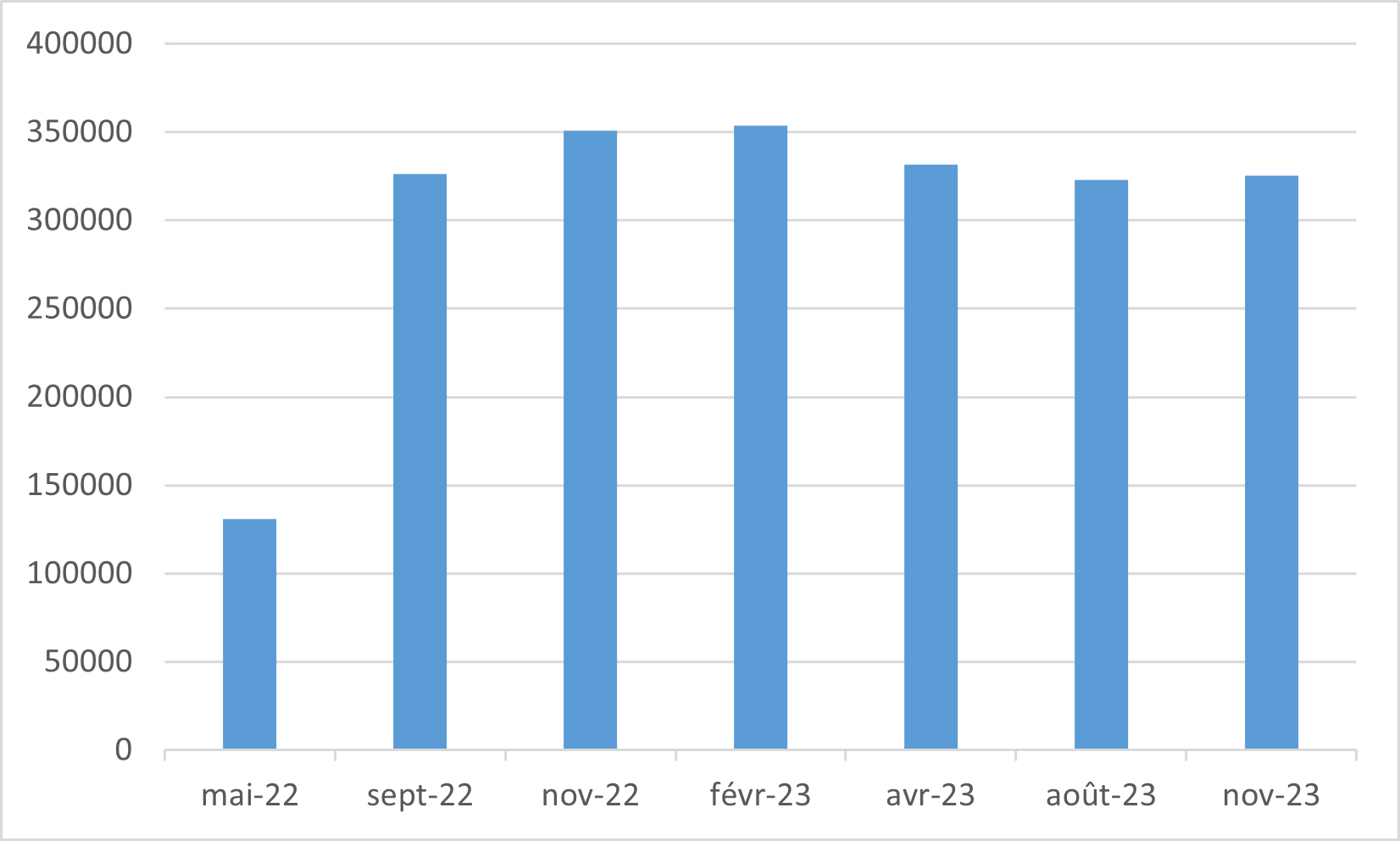New figures from the PES Network survey in November 2023 show that Public Employment Services continue to support the integration of displaced people from Ukraine.
The full overview with footnotes is available for download.
Public Employment Services are one of the main actors to help integrate displaced people from Ukraine in the labour market. To facilitate sharing of information and experience, the European Network of Public Employment Services is regularly collecting information from PES.
Number of persons registered with PES and people in employment show an increase since August 2023
New figures from the November PES Network survey show that there continues to be substantial variations between countries in terms of number of persons registered with Public Employment Service
In the November 2023 survey, over 325 000 of persons displaced from Ukraine were registered with PES. This figure shows the continuing steady trend of registrations with PES (see Figure 1). Most PES that have reported on this question, indicated a dynamic development with new registered and de-registered people integrating into the labour market. A large majority of those registered are women: in Poland and Italy this is as high as 85%.
In addition, the level of education of those registered varies significantly across countries. In 6 PES (out of 14 that reported of education levels), more than half of those registered have completed higher education. However, a larger proportion of the newly registered have a low level of education.
Figure 1. People displaced from Ukraine registered at PES

Source: European Commission, DG EMPL, PES Network questionnaire to PES
The number of displaced people from Ukraine in employment continues to increase in 13 PES (out of 23) where such data is available. In November 2023, these PES indicate that around 2 250 000 employment contracts were concluded with people from Ukraine. It is important to note that the figures reported by some countries may be based on the notifications from the employers and some include both Ukrainian citizens with and without temporary protection and persons with multiple contracts.
Displaced people from Ukraine who are in employment are more likely to work in sectors where there are labour shortages: essentially services, construction, and industry. 15 PES (out of 18 which reported on this question) indicate that displaced people from Ukraine who are registered with PES find jobs in accommodation and food service activities. Construction and Wholesale and Retail are also mentioned by 11 PES, closely followed by manufacturing /industry sector. The Netherlands mentions a majority of Ukrainian people (51%) working in the business services sector which includes temporary employment agencies.
PES continue to develop new initiatives to support job placement
Several countries reported introducing new measures, which are mostly focused on organising information events, in a similar way as they do for other newcomers to the country.
Belgium-Wallonia, for example, organises collective information sessions in accommodation centres about the local labour market. The PES also organises sector-specific training sessions (for example training for lorry drivers) and sessions about applying for jobs and signing up for French classes.
In Finland, specific information events are organised for ‘Reception Centers’employees, so that they can correctly guide their clients. Ukrainian and Russian experts have joined the counsellors’ teams to speed up and enhance all the services on offer. Information events are also organised about the labour market, employment, and Finnish classes. Several schools have organised training courses in Finnish for Ukrainians only. People from Ukraine are, however, increasingly mixed with other customers as mixing groups is felt to be more effective when learning a language.
In Germany, special ‘Job Turbo’ measures have been implemented at regional level with the objective to speed up integration and an accelerated access to the labour market. The action plan is based on 3 phases of labour market integration: “orientation and basic German acquisition”, “work and qualification in employment” and “stabilising and expanding employment”. Placing unskilled labour – possibly temporarily – occurs wherever possible and appropriate while skilled workers and experts are also eligible to work without any knowledge of the German language (e.g., in the IT sector). They are placed directly by agencies or job centres.
A part of the PES no longer differentiates between Ukrainians under temporary protection and other refugees to deliver some services like information sessions; for all of that, they maintain some targeted services like in Slovenia where more targeted language training is offered to Ukrainians because of the similarities in the language.
